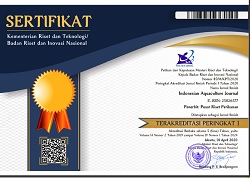THE APPLICATION OF LIFE CYCLE ASSESSMENT TO EVALUATE WATER QUALITY CONDITION AROUND FISH CAGES IN CIRATA RESERVOIR, INDONESIA
Abstract
Life Cycle Assessment (LCA) is an analytical tool used primarily for evaluating environmental conditions. The sources of decomposed organic matters in Cirata Reservoir originate from industrial activities, household waste, agricultural waste, and effluent from floating fish net cages. The wastes consist mainly of fat, protein, and carbohydrate. Bacteria are responsible for aerobic decomposition process of organic matters in the sediment. As bacteria consume oxygen during the decomposition processes, significant depletion of dissolved oxygen level in the waters may occur. This happens in Cirata Reservoir where a low level of oxygen in the water leads to anaerobic decomposition processes at the bottom of the reservoir. The porpuse of this study was to evaluate Cirata Reservoir water conditions, in terms of water quality, organic sediment and organic materials level based on the application of LCA. In this study, water and sediment samples were collected. Water quality conditions were measured in-situ. Water and sediment samples were analyzed in the laboratories. The results of the analyses showed that water quality condition in all sampling stations was relatively homogeneous. Based on the level of decomposition of organic matter, water quality conditions in Cirata reservoir could be classified as Class I, II, and III in IKA_STORET scale and categorized as poor. DO, sulfide, phenol, BOD, COD, total phosphate were outside the ranges of acceptable water quality standards.
Keywords
Full Text:
PDFDOI: http://dx.doi.org/10.15578/iaj.12.2.2017.83-91

Indonesian Aquaculture Journal is licensed under a Creative Commons Attribution-ShareAlike 4.0 International License.
















_25.jpg)


